|
|
When Billy Sunday brought his battle against the devil to Detroit in 1916, it was big news -- bigger than the reports from the World War raging in Europe and bigger than visits by mere presidents.
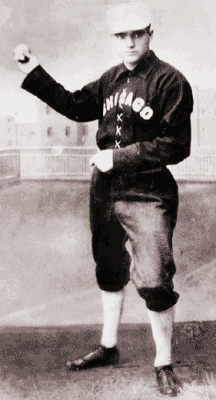 The evangelist in
his days with the Chicago White Stockings in the 1880s.
The evangelist in
his days with the Chicago White Stockings in the 1880s.
|
As his train rolled into town that September, more Detroiters were waiting at the station than President Woodrow Wilson found when he visited the that summer.
The baseball-player-turned-evangelist had come to town to save souls and help the "drys" in their campaign for state-wide prohibition. Michigan voters were to decide the issue in the November election.
Sunday was rabid in his opposition to demon rum. It was a key part of his crusades, and it had role in his own conversion.
William Ashley Sunday was born Nov. 19, 1862 in a log cabin in Ames, Iowa, and lost his father in the Civil War when he was a month old. His mother was so poor that she sent Sunday and his brother to an orphanage.
Sunday struck out on his own at 15, and worked a variety of jobs before becoming a professional baseball player. In 1883, he joined the Chicago White Stockings. Over the next eight years he played for a variety of National League teams.
Like most ballplayers of the time, Sunday did his share of drinking. One evening in 1887, he stopped to hear a group of gospel singers after leaving a Chicago saloon. They invited him to services at their mission and Sunday accepted. He experienced a religious conversion. Over the next few years, Sunday quit drinking, got married and became an evangelist preacher.
He began with revivals in small towns and then stormed the big cities, gaining fame and a huge following along the way. His career was at its height when he came to Detroit in 1916.
Sunday's fiery preaching drew thousands of Detroiters to his revivals -- and thousands of dollars into his collection plates. Those plates were huge dish pans, two feet across and 10 inches deep. His workers passed a pan for each of twelve sections, and they came back full of money. His last day's collection in Detroit in 1916, brought $50,000 from a crowd of 50,000.
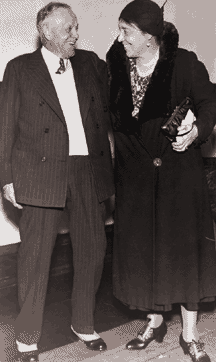 Billy Sunday and his wife,
"Ma" Sunday, in 1932, three years before his death.
Billy Sunday and his wife,
"Ma" Sunday, in 1932, three years before his death.
|
He also attracted the support of Detroit's leading citizens.
Dime-store king S.S. Kresge moved out of his palatial home so Sunday could use it as his battlefield headquarters. Automaker Henry M. Leland gave him a new $8,000 Cadillac as a "personal thanks offering." After a visit with Sunday, Henry Ford said that if Michigan voted for prohibition, the breweries could be converted to produce denatured alcohol as auto fuel for his cars. The ex-governor, Detroit police chief and some pro baseball players appeared with him at the revivals. And, merchant J. L. Hudson was a regular at the sermons.
Sunday's Michigan crusade that fall began in early September and lasted until early November. He claimed 2 million came to see him and 200,000 were converted. But the newspapers put total attendance at about 1 million with 25,000 converts. Whatever the number, Sunday had a big impact.
His preaching was electrifying. He attacked preaching with the fierce competitiveness of a turn-of-the-century ballplayer.
The church needs fighting men, Sunday said, not those "hog-jowled, weasel-eyed, sponge-columned, mushy-fisted, jelly-spined, pussy-footing, four-flushing, charlotte russe Christians.
"Lord save us from off-handed, flabby-cheeked, brittle-boned, weak-kneed, thin-skinned, pliable, plastic, spineless, effeminate, ossified, three-karat Christianity."
His Detroit revival tabernacle stood on a large field between Woodward and Cass at Forest. His stage held a choir of 5,000 singers. And, from that stage he led a frontal assault on sin:
"He appeared on the platform high above the sea of clean shining faces like a wispy cross between a businessman and an angel. Attired in a light gray suit and white shoes, a white negligee shirt of the finest linen and a white silk tie to match, Sunday feinted, walked and ran, crouched and jumped, from one end of the stage to the other, sweating from his gyrations until he was wet as a rag held under a pump.
"By his actions he kept the audience transfixed, hanging upon his every word and movement. He jumped on a chair; down on the floor again. He beat out a cadence with his fist upon the platform in order to emphasize a series of points; on top of the pulpit, he tore off his coat and collar and threw them to the stage ...
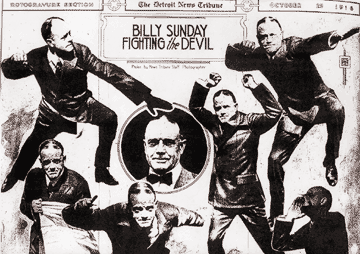 These views of Billy Sunday
energetically battling the devil appeared in the Rotogravure Section of
The Detroit News Tribune October 29, 1916.
These views of Billy Sunday
energetically battling the devil appeared in the Rotogravure Section of
The Detroit News Tribune October 29, 1916.
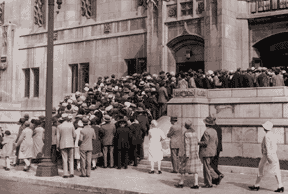 Detroiters
line up outside the Masonic Temple for a Billy Sunday meeting.
Detroiters
line up outside the Masonic Temple for a Billy Sunday meeting.
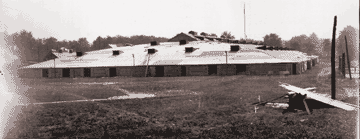 Sunday's Detroit
crusade "tabernacle" under construction in 1916.
Sunday's Detroit
crusade "tabernacle" under construction in 1916. 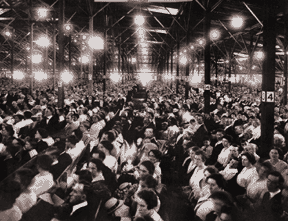 The audience listens raptly to Sunday inside the tabernacle.
The audience listens raptly to Sunday inside the tabernacle. 

